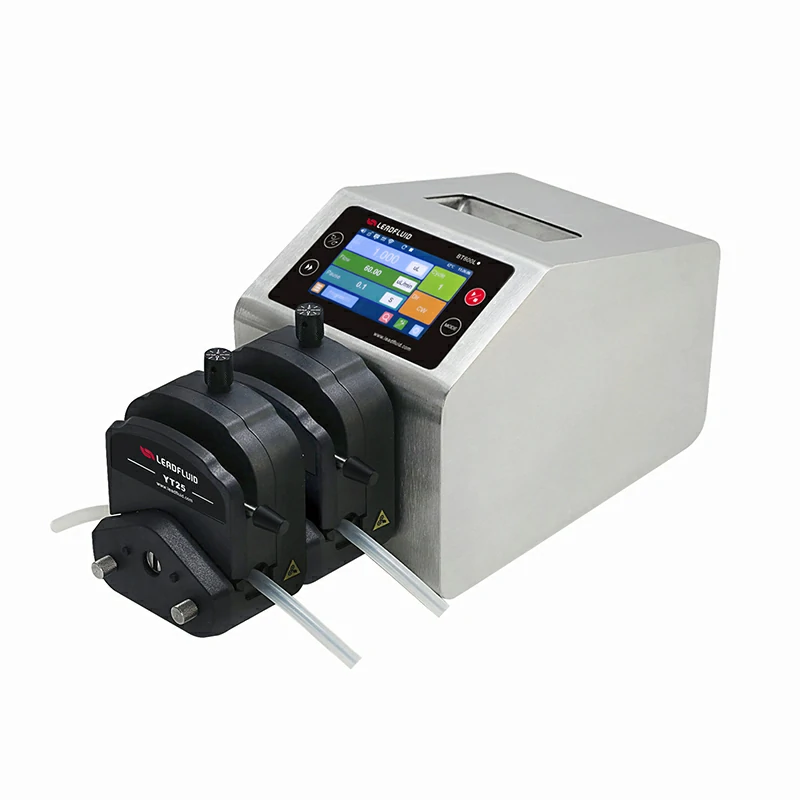What is the infusion pump for ?
An infusion syringe pump is a medical device used to deliver fluids or medications in small volumes with high precision and control. Unlike traditional infusion pumps that use gravity or peristaltic mechanisms, syringe pumps utilize a syringe as the fluid delivery mechanism. The syringe is typically held within the pump, and the plunger is driven by a motor to push the fluid at a controlled rate.
The infusion syringe pump is designed for applications that require precise and accurate delivery of small volumes of fluids, typically in the range of milliliters or microliters.
Some specific uses of infusion syringe pumps include:
- Critical Care and Intensive Care Units: Infusion syringe pumps are commonly used in critical care and intensive care units for delivering medications, such as vasoactive drugs, sedatives, or analgesics, in precise and controlled doses. These pumps allow for continuous infusion or intermittent bolus delivery, depending on the patient’s needs.
- Pediatric Care: Infusion syringe pumps are frequently used in pediatric care, as they can deliver small volumes of medication accurately, even in infants or small children. The precise control offered by syringe pumps is essential when administering medications with narrow therapeutic windows or when dealing with sensitive patients.
- Research and Laboratory Settings: Infusion syringe pumps find applications in research laboratories, where precise delivery of fluids or substances is necessary. They are used in experiments involving animal models, drug formulation testing, microfluidics, and other scientific studies requiring accurate fluid handling.
- Pain Management and Anesthesia: Infusion syringe pumps are utilized in pain management and anesthesia procedures, where precise administration of pain medications or anesthetics is vital. These pumps allow for controlled and gradual delivery of drugs, ensuring the patient receives the appropriate dosage at the required rate.
- Oncology and Chemotherapy: Infusion syringe pumps are employed in oncology and chemotherapy treatments, where small volumes of highly concentrated medications need to be delivered with precision. They enable controlled administration of chemotherapy drugs, reducing the risk of errors and ensuring accurate dosing.
- Neonatal Care: Infusion syringe pumps are used in neonatal intensive care units (NICUs) to deliver medications or nutrients to premature or critically ill infants. The pumps allow for precise and controlled delivery of small volumes of fluids tailored to the specific needs of neonates.
Infusion syringe pumps offer benefits such as high accuracy, precise control over flow rates, and the ability to handle small volumes. They are particularly useful in situations where the delivery of medication or fluids must be carefully regulated, tailored to individual patient needs, or when dealing with sensitive patients such as infants or neonates.
Application of infusion pump
Infusion pumps have numerous applications in various healthcare settings. Here are some common applications of infusion pumps:
- Intravenous Medication Administration: Infusion pumps are widely used for administering intravenous (IV) medications. They ensure precise and controlled delivery of medications, including antibiotics, pain relievers, chemotherapy drugs, and other critical medications. The pumps allow healthcare professionals to set specific infusion rates, dosages, and delivery schedules, enhancing patient safety and treatment efficacy.
- Fluid Replacement and Hydration: Infusion pumps are used to deliver fluids, such as saline solutions or electrolyte solutions, for fluid replacement and hydration. This can be crucial in cases of dehydration, electrolyte imbalances, or when a patient is unable to consume fluids orally. The pumps help maintain fluid balance and deliver appropriate volumes accurately.
- Parenteral Nutrition: Infusion pumps are utilized for administering parenteral nutrition, which involves delivering a mixture of nutrients directly into the bloodstream when a patient cannot consume food or nutrients orally. The pumps ensure precise and controlled delivery of carbohydrates, proteins, fats, vitamins, and minerals to meet the patient’s nutritional needs.
- Pain Management: Infusion pumps play a vital role in pain management by delivering pain medications, such as opioids or local anesthetics, in a controlled manner. They provide continuous or intermittent infusion of pain medications to manage acute or chronic pain effectively.
- Chemotherapy: Infusion pumps are commonly used in oncology for delivering chemotherapy drugs. They allow for accurate and controlled administration of chemotherapeutic agents over specific durations, ensuring consistent drug levels in the patient’s bloodstream. This helps enhance the effectiveness of the treatment while minimizing side effects.
- Antibiotic Therapy: Infusion pumps are employed for antibiotic therapy, ensuring precise and timely delivery of antibiotics to treat infections. The pumps can be programmed to deliver antibiotics at specific intervals and doses, optimizing the therapeutic effect and minimizing the risk of bacterial resistance.
- Anesthesia Administration: Infusion pumps are used in anesthesia to deliver intravenous anesthetics or analgesics during surgical procedures. They provide precise control over the administration of anesthetics, allowing anesthesia providers to adjust dosages and infusion rates based on the patient’s needs.
- Pediatric Care: Infusion pumps are particularly valuable in pediatric care, where precise medication dosing is crucial due to the smaller size and unique physiological characteristics of children. These pumps enable accurate delivery of medications and fluids, ensuring appropriate treatment for pediatric patients.
- Home Infusion Therapy: Infusion pumps are increasingly used in home healthcare settings for patients requiring long-term medication or fluid therapy. They allow patients to receive necessary treatments at home, under the guidance of healthcare professionals, enhancing convenience and patient comfort.
These are just a few examples of the broad applications of infusion pumps in healthcare. Infusion pumps provide precise, controlled, and reliable delivery of medications and fluids, improving patient outcomes and safety across a range of medical conditions and treatments.

